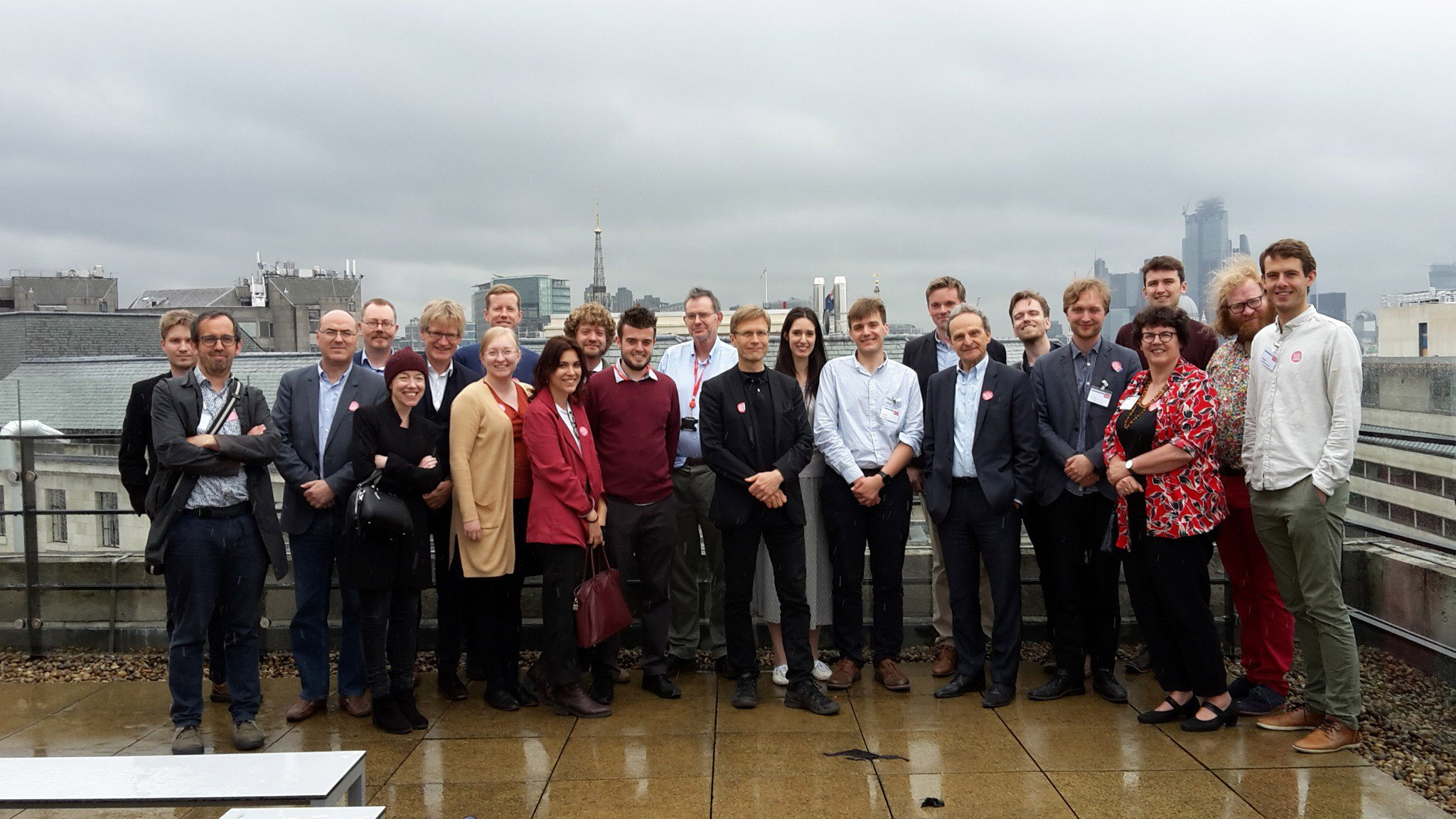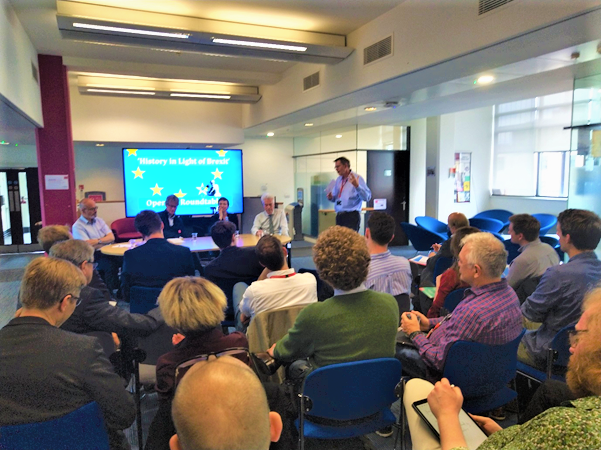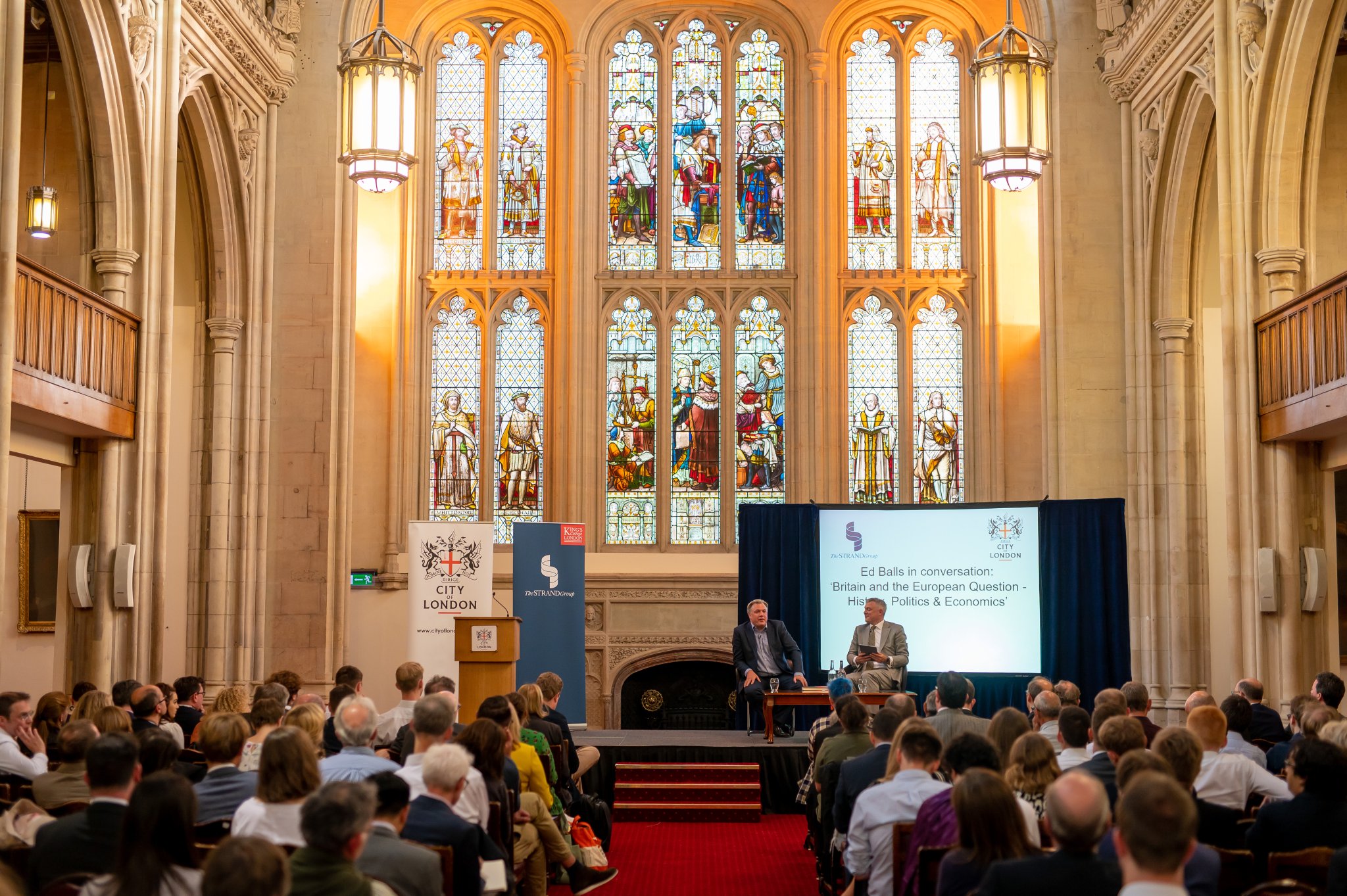History in the Light of Brexit | 5-7 June 2019 | London, United Kingdom
On 5-7 June 2019 the Seventh International PhD Conference in Political History took place in London United Kingdom.
Conference Report
By Talita Ilacqua, Tom Kelsey and Richard Vinen
There have been, and will be, numerous conferences about the causes and consequences of Britain’s departure from the European Union. Our conference was not one of them. Rather, we thought about history in light of Brexit as we explored the questions that Brexit poses for how historians should think about the modern political history of Europe and beyond.

Our event was the Annual Conference of the Association of Political History, which brings together PhD students from universities across Europe to discuss their work and ideas. The conference was also kindly supported by King’s Contemporary British History, King’s Department of Political Economy, the Strand Group and the History of Parliament Trust.
This conference report summarises the plenary discussions and then lists the papers of the graduate students who attended.
Opening round table
The conference began with a round-table on history in light of Brexit with Sir Stephen Wall, Professor Helen Parr and Professor Robert Tombs.
Wall was Private Secretary to the Prime Minister between 1991 and 1993, responsible for foreign policy and defence issues; he was sent as Ambassador to Portugal from 1993 to 1995 and then became the Permanent Representative to the European Union. He returned to London in 2000, and from then until 2004, he was in charge of the Cabinet Office’s European Secretariat and also EU adviser to Tony Blair. He also authored The Official History of Britain and the European Community, Vol. II (Routledge, 2012).
Wall argued that Britain, an island nation, was obviously geographical apart from Continental Europe, which had a profound psychological impact. In the immediate post-war period, Britain also had the Commonwealth, a set of overseas relations different in scale to any other European power.
In addition, he reminded us that Britain’s democratic institutions had not been destroyed or delegitimised during WW2. He pointed to the distinctiveness of sovereignty resting in Parliament, as opposed to the people.

However, by 1961, it was clear that this post-war imperial strategy had failed. Britain under the Conservatives then tried to enter Europe as a reluctant partner. The Wilson government would come to the same view by the late 1960s.
Professor Helen Parr is perhaps now best known as a military historian, for her award-winning work Our Boys (Penguin, 2018). Yet, she first worked on the post-war politics of Britain and Europe. Her first book being Britain’s Policy Towards the European Community, 1964-1967 (Routledge, 2005).
Parr began with the observation that she lives in Stoke-on-Trent, a place where the Guardian always sends journalists to understand the views of working-class Brexiteers (thus missing out the vast swathes of middle-class Home County Brexit voters).
She argued that the referendum marked a decisive turning point in Britain’s foreign policy, which had been bound up with Europe for decades. During the late 1960s and early 1970s, the line among officials was that being in Europe was the only way to preserve British power aboard.
Europe was never such a central political issue. Even for the Eurosceptic Labour left, the aim was socialism, not merely leaving Europe. Farage, of course, changed this. He made Brexit more of the end, rather than the means.
Parr highlighted the high degree of contingency in the EU referendum. Seeing it as a historical accident, a Prime Minister’s tactical misstep. Without austerity, the political failure in Eurozone and the migrant crisis, it is likely that Remain would have won.
Parr also suggested that politics will probably not return to normal. Historians may well look back upon our times as a period of profound change: when the major political parties broke up, when the union was destroyed and when Britain’s power in the world went into a major decline.
The final speaker was Professor Robert Tombs, a historian of France, Britain and Europe. His latest book was The English and their History (Penguin, 2015). More generally, he is perhaps the most notable Brexiteer within the historical profession. For instance, he is the force behind briefings4brexit.
Professor Tombs began with the observation that Europe had been made, but Europeans had not. Regardless of the propaganda, few citizens of Europe felt like Europeans. The European Union created its own sense of inevitability, but Brexit exposed the hollowness of this.
Tombs stressed how political turmoil was not just a problem in contemporary Britain. In fact, he argued that there are far more major political problems across Europe than Brexit. For instance, a dozen people had died in France as a result of the ‘gilets jaunes’ protests. Indeed, Tombs stressed how Brexit is not a political crisis on the scale of the 1930s, 1970s or 1980s. Rather, Brexit is essentially a problem of political leadership, caused by the ruling elite ignoring the mandate of the people.
The issue with Europe is that power operates horizontally, not vertically. Drawing on Wolfgang Streeck, Tombs argued that the elite who runs the EU remains powerful through legitimising their influence via other European elites, as opposed to gaining the consent of the people.
Was Brexit inevitable? Tombs suggested that history does not determine things, but implied that undemocratic, unaccountable organisations usually do eventually break down.
In the questions and answers, it was asked whether the European Union was a product of the Cold War, delegitimatized by its ending. Parr agreed.
Some members of the panel described the referendum as weirdly ‘un-English’ or ‘un-British’ due to its ‘utopian’ flavour. Richard Johnson, a lecturer at Lancaster University and a prominent Lexiteer, questioned the framing of ‘fact vs utopia’, suggesting rather that the problem was those who thought economically were squaring off against those who thought in terms of democracy.
Professor Vinen confessed that recent events made him more ‘nostalgic’ for the ‘managed democracies’ of the post-war years. They may have been iniquitous at times, but they were more stable and less dangerous. One of the panel asked him whether he believed in democracy. He said: ‘No’.
It was at this moment, we wrapped things up and moved to our reception in Parliament.
Careers advice
On Thursday afternoon, we had a careers advice session led by Dr. Dorothée Boulanger, a lecturer at the University of Oxford; Dr. Kit Kowol, an Early Career Development Fellow in Modern British History at King’s College London and Dr. Ben Taylor, who completed his PhD at King’s before moving on to work in the policy world, first at the House of Lord and now in the Cabinet Office.
It was stressed that the value and, indeed, scarcity of PhDs was much higher in the non-academic world. Ben Taylor said a three-month, AHRC-funded placement in Parliament, which he did whilst he was studying, enabled his post-PhD career in the policy world. As it happens, Taylor now actually works for the Open Innovation Team, which helps Whitehall departments generate analysis and ideas by deepening collaboration with academics. These placements include PhD students, both those in Britain and the EU. Here’s a link to some example placements.
In terms of the academic job market, Dorothée Boulanger and Kit Kowol stressed the importance of luck, perseverance and networking, plus having strategies for particular institutions, as different history departments will require different skills.
Boulanger explained how she wished she had spent more time writing journal articles and less time going to conferences. (Thankfully none of our attendees left the room at this point to get on with that paper they were working on…) She also said that it was vital to come across not only as an excellent researcher in the job interview process, but also a good colleague. Being a team player is something departments are looking for!
Kowol warned against investing all of your self-worth into the PhD, saying how it is important to remember that it is just a steppingstone. Seeing it as a personal masterpiece will make finishing much harder. Moreover, you shouldn’t feel like a failure as a person if something PhD-related doesn’t go as planned along the way. He then underlined the importance of finding (not just expecting to find) a good group of supportive friends around you in the academy at a similar stage in their careers. He also stressed the importance of keeping the focus on the big intellectual questions that mark you out.
Ed Balls on Britain and the European Question
Later that evening, we attended an event at the Guildhall, where the former Shadow Chancellor of the Exchequer Ed Balls reflected on the relationship between Britain and the EU in conversation with Jon Davis, who leads the Strand Group at King’s College London.
Balls’ central claim was that New Labour was simply a continuation of the European policy of their predecessors. Indeed, in this respect, Balls suggested that Thatcher, Major, Blair and Brown could all be lumped together.
Balls argued that Britain was different from the other nations of the EU. There was an expectation that Britain would be difficult all negotiations, a built-in assumption that Britain’s national interest did not fit with that of other member states.
Balls also suggested that if Britain had joined the Euro, they would have crashed out of the EU sooner, as this would have been the only way to manage the fall-out of the Eurozone crisis. He also stressed the importance of the Pound to British national identity.
According to Balls, Blair’s championing of the EU’s enlargement (see this map for details) was partly to placate the Foreign Office, who were still reeling from the fact that Britain had not joined the Euro.
In a very striking comment, Balls described it as “a major intellectual failure” of the Blair years not to foresee how important an issue immigrant would become as a result of the EU’s enlargement into Eastern Europe.

Balls argued that when the Treaty of Rome was signed, it was assumed that freedom of movement would be for elites, not those seeking work. Speaking as a “pro-European”, Balls suggested that freedom of movement was not sustainable when the EU contained countries of vastly different incomes.
In terms of Britain’s future, Balls thought the nation was in a “catastrophically bad place”. He saw the current impasse lasting for another two or three year because Parliament cannot not agree on a deal, nor can MPs accept no deal. Moreover, given how unstable British politics is at the moment, no Prime Minister would risk a general election. Balls accepted that he could be proven wrong on this last part of his argument. Interestingly, he also ruled out support for a second referendum, suggesting that this would be “political dynamite”.
All in all, Balls cast himself and New Labour more generally as reluctant Europeans. It will be interesting to see whether, in a few decades or so, the archives themselves will agree with this interpretation of such an important part of our recent history.
Englishness and Brexit: Professor Patrick Wright in conversation with Professor David Edgerton
On Friday, the conference concluded with an enormously interesting, rich and complex discussion, with Professor Patrick Wright in conversation with Professor David Edgerton on Englishness and Brexit.
Professor Edgerton began by suggesting that there are not supposed to be any intellectuals in Britain. Yet, Wright not only is one, but also studies them. See, for instance, Wright’s BBC Radio 4 series ‘The English Fix’.
Professor Wright introduced his latest project about the Isle of Sheppey, a place he is using to study what others might call the ‘left behind’. Wright himself loathes this phrase. It suggests a passivity, as those it seeks to describe appreciate. One islander argued he was a ‘stayed behind’.
The conversation then moved onto Nigel Farage, who Wright sees as a ‘Little Englander’ – a term that had always been used as an insult, but by the late nineteenth century had also been reappropriated by those it sought to offend.
Figures like G. K. Chesterton called themselves as ‘Little Englanders’, defenders of the true England, which was being encroached upon by the state and by capitalism. Wright observed and perhaps warned how all organicist thinking contained this deep sense of a looming threat.
For Farage the encroaching force has, of course, become the European Union. Like Farage, Chesterton also linked Englishness to beer, as he defended the pub against the teetotallers in the Liberal and Labour parties.
Wright observed the deep chauvinism within the ‘Little England’ philosophy. While women had been crucial supporters of its leading figures, rarely were women themselves the leaders.
After taking questions from the audience, Professor Edgerton wound up the conversation, thanking Patrick for his reflections on Brexit and Englishness.
Graduate speakers
Session 1: Identifying ‘Europeanness’
Chair: Dr. Margit van der Steen – Research School Political History, Onderzoekschool Politieke Geschiedenis
Discussant: Pasi Ihalainen – University of Jyväskylä
- Stuart Smedley – King’s College London – The Historical Will of the People: the value of public opinion polls and surveys for contemporary political historians after Brexit
- Jean-Francois Delangre – University of Geneva – “I Beg Your Pardon, But WE Suffered The Most!”: contested memories and victimhood competition in the EU, the Baltic States from restauration of their independences until present day
- Martin Johansson – Södertörn University – Competing Neighbours, and their Genders: media narratives on Norden as imagined region at the 1936 Olympic Winter Games
Session 2: Battling identities
Chair: Professor Giovanni Orsina – LUISS Guido Carli University
Discussant: Professor Henk te Velde – Leiden University
- Talitha Ilacqua – King’s College London – ‘Il n’y a plus de Pyrénées’?: border disputes and identities in the French Basque Country (1785-1868)
- Miel Groten – Vrije Universiteit – Glasgow’s New Town Hall: imperialism and civic pride, 1877-1889
- Wiivi-Maria Jouttijarvi – University of Jyväskylä – National Identity In and After a Multinational Imperium: the case of Estonia
Session 3: Comparative histories
Chair: Dr. Jussi Kurunmaki – Södertörn University
Discussant: Professor Irène Herrmann – Université de Genève
- Tom Kelsey – King’s College London – ‘High technology’ in post-war Britain and France
- Lauri Niemisto – University of Jyväskylä – Violent and Illegitimate Protest: visual representations of British suffragettes’ and German socialists’ campaigns for franchise reform in national cartoons, 1905 – 1914
- Risto-Matti Matero – University of Jyväskylä, Finland – From Companionship to Green Consumerism: a case study of a major conceptual change in German greens’ beliefs regarding human nature between 1980 and 2002
Session 4: The military, society and exceptionalism
Chair: Dr. Marnix Beyen – University of Antwerp
Discussant: Professor Richard Vinen – King’s College London
- George Evans – King’s College London – Militarism, British Exceptionalism and Anglo-Irish Officers
- Giulia L. Melideo – LUISS Guido Carli University – The ‘Associated’ Country: Greece and the EEC during the military regime (1967-1974)
Session 5: Histories beyond Europe
Chair: Professor Marc Lazar – Sciences Po
Discussant: Professor Pertti Ahonen – University of Jyväskylä
- Lasse Lassen – Universität Bielefeld – The Tricontinental Conference of Havana: Cuba creating the internationalist isle
- François Courvoisier – University of Geneva – From Exceptionalism to Universalism: the conflictual globalization of human rights, the case of the African Charter for Human and Peoples’ Rights
- Björn Reynir Halldórsson – University of Iceland – Within or Without Europe: crises of two island states in the Atlantic since 2008
